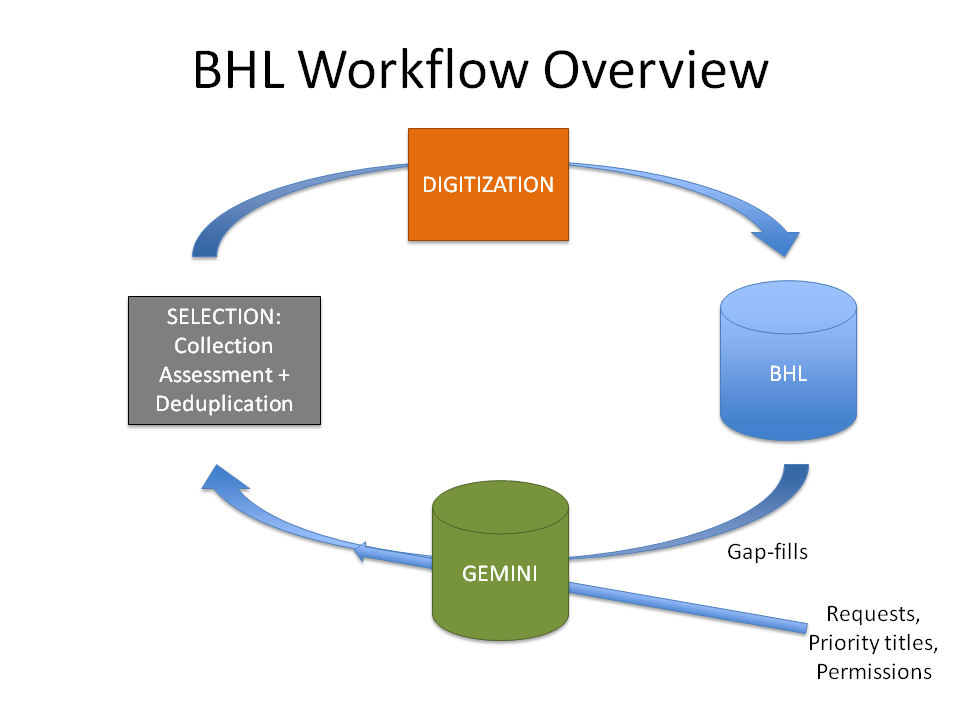Why We Need It
Back to
De Gruyter paper overview
CrowleyIFLA.docx
 Intro
Intro
- The Biodiversity Heritage Library (BHL) is a consortium of 12 natural history and botanical libraries that cooperate to digitize and make accessible the legacy literature of biodiversity held in their collections and to make that literature available for open access and responsible use as a part of a global “biodiversity commons.”
- Thesis statement material: We need Gemini to monitor user behavior for BHL because it documents and tracks real feedback from real people, allows us to process scanning requests, allows us to crowd source problems with the collection and address them as needed, allows us to engage with our users, esp. our most "vocal" users, etc.
Gemini: Why we need it?
- BHL is unique: BHL is a unique mass digitization scanning project in that it virtually brings together the collections of 12 major institutional libraries whose physical materials are otherwise managed separately. Each BHL institution participates in the project by volunteering its own staff, managing their own workflows, shipping/receiving, etc. We are scanning the selected contents of each institution's shelves to amalgamate the complete works of public domain biodiversity literature online.
- It would be hard to set up a union BHL catalog: It would be prohibitively time and labor intense (and nearly politically impossible) to align the BHL members' catalogs into a single ILS as the BHL is but one project within the larger context of the overall goals and objectives of each institution.
- Mass digitization scanning is about quantity [let's just be honest]. You do what you can to select materials for scanning that do not duplicate content already scanned but this can get very tricky when you have 12 libraries with very similar collections. More about mass digitization practices, pros & cons, etc.
- Scanning workflow overview [as pictured above]. You select materials, send them for digitization, and serve them via a web portal. Multiply this process 12 times over [we'll just go with 12 for the sake of argument here] and factor in the following: the incomplete collections of a single institution, various and fluctuating digitization schedules (libraries send books for scanning on a weekly to monthly basis depending), materials that will be rejected from the digitization process and materials that are scanned improperly (missing pages, fingers, etc.). Yes, QA happens but it's impossible to do 100% QA with limited staff resources.
- Gemini closes the gap in the overall scanning workflow because it serves as a communication platform between the BHL portal and the selection process.
- Internally: It allows the librarians from 12 different institutions to collaborate among one another to resolve problems with the collection and ensure that the complete contents of a given work are made available. It is not uncommon for 3 libraries to have to work together to get the complete series of a title scanned. Also helps each library to manage their own internal workflow. BHL scanning workflow like a clock with each BHL member library as a gear - smoothly turning gears working together = better BHL. Reference Gemini as a sort of wiki tool - allows us to leave comments, attach files, add hyperlinks to external sites, interlink related issues. As current deduplication tools work at the title level, Gemini allows us to work at the item level [hmm, this could get confusing...maybe it's not worth going into].
- Externally: It allows us to harness the crowd in maintaining the BHL collection. This crowd-sourcing allows a couple librarians to effectively manage the 87,000 plus volumes and growing collection. Gemini documents and tracks user behavior with regard to scanning selection, QA, deduplication (i.e. title merging), maintaining relevant content, correcting metadata, and providing reference help. Feedback from users informs known issues and inspires new development regarding technical functionality. Maximizes ability to implement rapid-development and user-centered-design principles...
- No other tool/platform would be able to deliver. Email, wikis, social-networking tools, blogs = fail.
http://www.oclc.org/reports/2010perceptions.htm - maybe useful?

